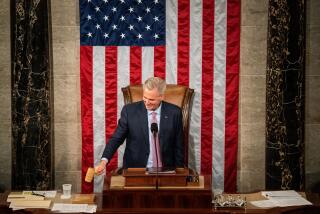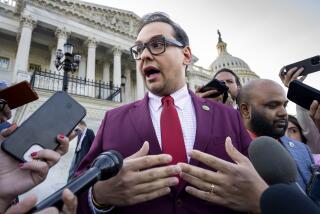Rep. Paul Henry; Rising Star of Republican Party
- Share via
GRAND RAPIDS, Mich. — Rep. Paul Henry, among a handful of young Republicans considered party stars of the future, died Saturday of brain cancer that was diagnosed in October. He was 51 and was found to have had incurable cancer after complaining of headaches while campaigning for a fifth term.
Henry, whose moderate views came to national prominence in 1990 when he offered what he called “decency wording” to guidelines for grants from the National Endowment for the Arts, died at his home.
President Clinton and First Lady Hillary Rodham Clinton said they were deeply saddened by Henry’s death and praised his courage in facing illness.
“It’s tragic when such a productive and promising life is cut short much before its time. His personal courage and bravery will be an inspiration to us,” they said in a statement.
Although doctors had offered a grave prognosis in October after removing most of a three-inch malignant tumor from the right frontal lobe of Henry’s brain, the popular politician easily won reelection two weeks later. Thousands of letters of support flooded his home and offices.
In the months that followed, Henry, his family and staff tried to remain upbeat and did not address the possibility of his resignation.
But by late spring, Henry was mostly bedridden at his home. By summer, his staff said, he could not communicate and they were not sure if he recognized friends.
First elected to Congress in 1984, Henry had won by increasing margins in each of his campaigns.
In 1990, Henry was named one of 11 “rising stars” by the National Journal. He was said to be a strong contender for the 1994 race against Democratic Sen. Donald Riegle.
A Chicago native, Henry graduated from Wheaton College in Illinois and served with the Peace Corps in Ethiopia and Liberia for two years before earning a master’s degree and doctorate from Duke University.
He taught political science at Duke in 1969 and at Calvin College from 1970-78 before being elected to the Michigan Legislature in 1979. He served in the state House from 1979 to 1982, and in the state Senate in 1983 and 1984.
He was elected to Congress in 1984, to the 3rd District seat once held by former President Gerald R. Ford.
More to Read
Get the L.A. Times Politics newsletter
Deeply reported insights into legislation, politics and policy from Sacramento, Washington and beyond. In your inbox twice per week.
You may occasionally receive promotional content from the Los Angeles Times.










